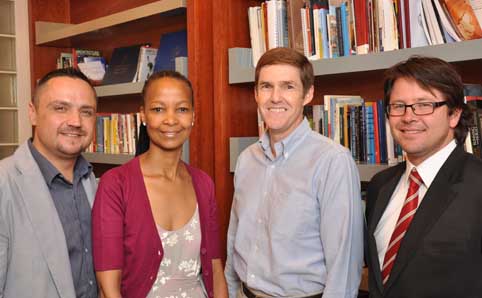Latest News Archive
Please select Category, Year, and then Month to display items
12 October 2020
|
Story Dr Cindé Greyling
|
Photo Supplied
 Exercise and nutrition can work wonders for your mental health – you don’t even have to ‘feel like’ or ‘enjoy’ moving around and eating well for it to work – it does its thing anyway.
Exercise and nutrition can work wonders for your mental health – you don’t even have to ‘feel like’ or ‘enjoy’ moving around and eating well for it to work – it does its thing anyway.
Nowadays, people talk about mental health like it is the common cold – which is good! But do you know what it really means? Being mentally healthy does not only refer to the absence of a mental illness but includes your emotional and social well-being. One would almost want to add physical well-being too, since a healthy body does indeed support a healthy mind. However, since so many people consider themselves ‘mental health experts’, some myths have been sold as truths.
Myth #1 – You are doomed.
Nope. Never. You are never doomed. There is always help. Mental-health therapies range from self-help, talk therapy, medication, to hospitalisation in some cases. Somewhere on this spectrum of treatments, there will be something that works for you. But you must be willing to get the help and do the work. For starters, exercise and nutrition can work wonders – you do not even have to ‘feel like’ or ‘enjoy’ moving around and eating well for it to work – it does its thing anyway.
Myth #2 – It won’t affect you.
It may. Research suggests that one in five people may suffer from a mental illness at some point in their lives. Being well now does not mean that it will stay that way. Biological and environmental factors both impact your mental health. Hopefully not, but at some point, you may experience an event that affects your mental health.
To remain integrated in a community is always beneficial
for anyone suffering from a mental or physical condition.
Myth #3 – Someone struggling with mental health must be left alone.
Hardly! To remain integrated in a community is always beneficial for anyone suffering from a mental or physical condition. You do not need to fix them, but to remain a friend. Continue to invite them, even if they decline. Do not judge, and do not try to understand. Just stay around.
Go and be kind to yourself, and to those around you.
US Consul-General learns about transformation at the UFS
2011-11-11
 |
|
A delegation from the US consulate came to learn more about our transformation initiatives and the Leadership for Change programme. From the left are: Prof. Aldo Stroebel, Director of International Academic Projects in the Office of the Vice-Chancellor; Mrs Dineo Gaofhiwe-Ingram, Assistant-Director: International Affairs; Mr Earl Miller, US Consul-General; and Mr Rudi Buys, Dean of Student Affairs.
|
When others visit our university to learn more about our transformation initiatives, we certainly are on the right track.
Mr Earl Miller, Consul-General at the United States Consulate in Johannesburg, paid our university a visit as part of his orientation trip to the Free State.
Mr Miller, who was accompanied by two senior colleagues from his office, was interested to learn more about our university’s initiatives relating to transformation, the Leadership for Change programme and the work done at the International Institute for Studies in Race, Reconciliation and Social Justice.
He met with some of the students who had recently returned from the USA and Europe to reflect on their experiences on the programme and expressed his appreciation for the initiative, since it also afforded American students an opportunity to learn from their South African peers.